

Problematic books. Infographic. Books and boys. School wide reading culture. 10 ways to get the most out of silent reading in schools. Graphic Texts. Resources and Toolkits. The Graphic Novels & Comics Round Table Resources and Toolkits collects, creates, and promotes content around how to best use comics in the classroom, in the library, and in advocacy. 2019 Sept #CreatorsGetCarded promotion for #LibraryCardSignup Month NEW!
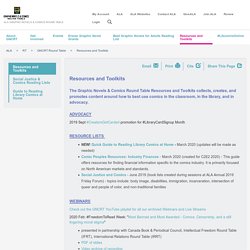
Quick Guide to Reading Library Comics at Home - March 2020 (updates will be made as needed) Comic Peoples Resources: Industry Finances - March 2020 (created for C2E2 2020) - This guide offers resources for finding financial information specific to the comics industry. It is primarily focused on North American markets and standards. Error - Cookies Turned Off. Individuals differ greatly in their performance in sports, games, music, and education, and hardly surprising, those who practice more perform better (Macnamara, Hambrick, & Oswald, 2014; Macnamara, Moreau, & Hambrick, 2016; Mosing, Madison, Pedersen, Kuja‐Halkola, & Ullen, 2014).
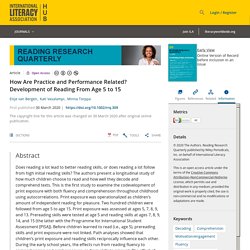
The big question that psychologists have sought to answer is whether differences in performance level are merely the result of differences in accumulated practice, or the other way around, in other words, whether initial success stimulates and failure discourages practice. In this study, we focused on education and asked, Do children who achieve above average in school do so because they have practiced a lot, or do children with a high initial skill level engage more in activities in which they develop those skills even further?
Previous studies have demonstrated that avid readers are also better readers (Anderson, Wilson, & Fielding, 1988; Cunningham & Stanovich, 1997). 1 Method 1.1 Participants 1.3 Measures. Jane Austen, Isaac Asimov, Barbara Cooney: Books Briefing. A writer who is good for you “No other author goes with such casual intimacy as [Austen] … into the vulnerable spot where society touches the root of self.
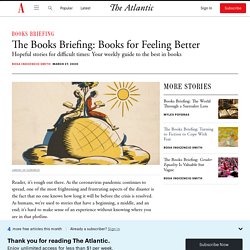
And few authors are at the same time so quietly fearsome and so intensely consoling.” 📚 Pride and Prejudice, by Jane Austen 📚 Emma, by Jane Austen 📚 Jane Austen: A Life, by Claire Tomalin 📚 Jane Austen: A Life, by David Nokes 📚 “The Janeites,” by Rudyard Kipling The sprawling, empathetic adventure of Saga “Saga relies on a stable of heroes, antiheroes, and villains who span the spectra of age, class, gender, race, and sexual orientation … [The series] stands out as a profane, glorious ode to compassion and equality.” What Parents And Teachers Need To Know About Reading While Schools Are Closed—And Beyond.
Some teachers—and parents—are confused by conflicting claims about how to help kids understand what they read.
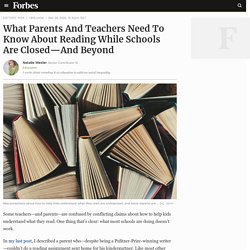
One thing that’s clear: what most schools are doing doesn’t work. The trick to getting your kids hooked on books. Life-style, books, Every time I have spoken to a school-aged audience in the past five years I've asked every adult to shut their eyes, then asked the young people to put their hands up if they think books are boring.
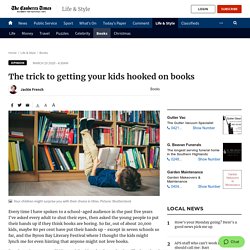
So far, out of about 20,000 kids, maybe 80 per cent have put their hands up - except in seven schools so far, and the Byron Bay Literary Festival where I thought the kids might lynch me for even hinting that anyone might not love books. But those 80 per cent of kids are right. Most books are boring. Radio drama and fiction podcasts are having a renaissance as artists make television for your ears. Updated 17 Mar 2020, 1:51amTue 17 Mar 2020, 1:51am Space to play or pause, M to mute, left and right arrows to seek, up and down arrows for volume. Audio: Remembering Blue Hills (Myf Warhurst) During the glory days of radio drama in the 40s and 50s, the ABC and commercial entertainment companies were cranking out hundreds of episodes every week — feeding an audience, from Australia and beyond, all glued to the wireless to get their fix of serials like Dad and Dave or The Lawsons.
But the advent of TV put a dent in this golden age, and although radio drama was broadcast regularly on the ABC in the subsequent decades, the 2000s saw it decline — culminating with the ABC axing its radio drama show in 2013. Australia Reads – This September we’re inviting Australians of all ages and from all walks of life to share and celebrate the joys of reading. Improving reading outcomes for students with dyslexia. Unlike speech, which is an ‘innate’ ability acquired by humans, reading is a complex task that requires specific instruction.
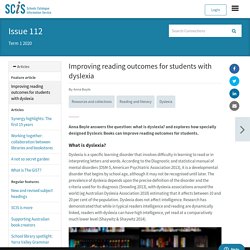
It involves the activation of several auditory and visual processes in the brain at the same time. In an alphabetic language such as English, text characters represent phonemes, the basic units of spoken sound. Phonemes make up syllables, which in turn make up words. Words are grouped into phrases and sentences that contain meaning. How to Create Reading Culture. Regular reading is vital to improving students’ literacy skills and their overall academic performance.
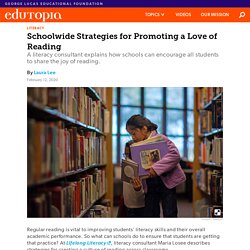
So what can schools do to ensure that students are getting that practice? At Lifelong Literacy, literacy consultant Maria Losee describes strategies for creating a culture of reading across classrooms. Make sure classroom libraries are engaging: Surround students with diverse and interesting material, and add new titles to your classroom collection with an eye toward a wide range of interests. “I cannot just buy what I like to read, I have to buy what I know will get my readers excited to read,” teacher Amy Heno told Losee. Literature-s-future-what-happens-when-ai-rewrites-books-20200306-p547lb. Their machine scans printed books and runs an AI over the text, picking out a scattered few of the most “salient” words on a page to form a classic haiku poem.
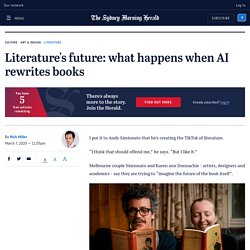
It then erases all the other words and plonks onto the page the internet meme or image it deems most appropriate. The pair have used this to transform famous works of literature, 50 Shades of Grey and a chess manual into weird, truncated, poetic, nonsensical, somehow accidentally meaningful, accidentally funny vandalisation/reinterpretations of the originals. They call it their Library of Non-Human books, a project to be exhibited at next week’s Melbourne Art Book Fair, the opener for Design Week. It’s a “post-human endeavour” that’s already infuriating people, which makes Karen and Andy delighted. “I might end up in a fist-fight with a poet,” jokes Simionato. “What gets called into question is the literary value of the poem. Children are reading less than ever before, research reveals. Children today read less frequently than any previous generation and enjoy reading less than young people did in the past, according to new research.
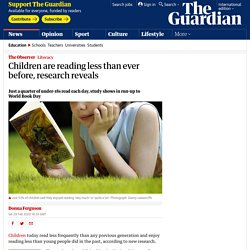
The work, to be published by the National Literacy Trust in the run-up to World Book Day on Thursday, shows that in 2019 just 26% of under-18s spent some time each day reading. This is the lowest daily level recorded since the charity first surveyed children’s reading habits in 2005. It also found that fewer children enjoy reading, and that this dwindled with age: nearly twice as many five to eight-year-olds as 14 to 16-year-olds said they took pleasure from reading. Overall, just 53% of children said they enjoyed reading “very much” or “quite a lot” – the lowest level since 2013. The poet and former children’s laureate Michael Rosen said the findings should act as a wake-up call for the government. As Harry Potter turns 20, let's focus on reading pleasure rather than literary merit. It’s 20 years on June 26 since the publication of Harry Potter and the Philosopher’s Stone, the first in the seven-book series.
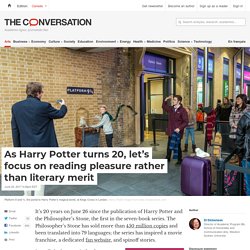
The Philosopher’s Stone has sold more than 450 million copies and been translated into 79 languages; the series has inspired a movie franchise, a dedicated fan website, and spinoff stories. I recall the long periods of frustration and excited anticipation as my son and I waited for each new instalment of the series. This experience of waiting is one we share with other fans who read it progressively across the ten years between the publication of the first and last Potter novel.
It is not an experience contemporary readers can recreate. HuffPost is now a part of Verizon Media. Getting kids to read at home can be a challenge for many parents. So we asked several “bookstagrammers” ― aka children’s literature lovers and influencers on Instagram ― for some of their favorite tips for getting kids, especially emerging readers, to pick up a book more often and to foster a love of reading in your children. Mary Costello, a mom of two with a Masters in Elementary Education, spent 10 years in the classroom before becoming a stay-at-home mom. She started a website and Instagram account dedicated to recommending children’s books and literacy tips for parents. Find her at @childrenslitlove. - The Washington Post. Print Story Books Encourage More Meaningful Interactions Between Kids and Parents. The benefits of exposing kids to books at a young age are clear. One study from 2018 found that reading out loud to kids improves their behavior, and according to a different study published that same year, children from homes filled with books grow up to have better reading comprehension skills.
Now, new research suggests that not every type of book has the same impact. Reading out loud from physical print books, as opposed to reading words read off a screen, leads to richer interactions between parents and children, The New York Times reports. For a recent study published in the journal Pediatrics, University of Michigan researchers watched 37 parents read out loud to their toddlers. Alvin Irby: How to inspire every child to be a lifelong reader. Children’s Laureate says lifelong readers made at public library. We all want our children to be good readers. For life. To be free, fully literate citizens. No arguments. As the Australian Children’s Laureate for 2020-2022, my central purpose is to encourage this – but there are ever-growing challenges in our digital age.
New-children-s-laureate-worries-for-teen-readers-20200205-p53y1f. At Brisbane's new Fortitude Valley State Secondary College, learning will be paperless, while a Victorian school has replaced librarians with "change adopters" who host discussions with students and teach "soft skills" such as ethical and creative thinking "Libraries are not just sources of information, they are sources of the imagination," she said. How Banning Books Marginalizes Children. There is an alternative tradition of using children’s literature specifically to introduce more diverse perspectives to young readers that dates back to The Juvenile Miscellany, which encouraged empathy for American Indian and slave characters. This practice mostly remained economically and culturally marginalized until the 1960s, when books like Ezra Jack Keats' The Snowy Day and Don Freeman’s Corduroy began to naturalize the experiences of children of color.
7 Surprising Reading Facts That Prove It All Adds Up. Why Reading Aloud to Middle School Students Works. Successful student reading engagement initiatives. Your guide to reading the world. “I’d always thought that I was well-traveled,” says writer Ann Morgan (TED Talk: My year reading a book from every country in the world), but “actually, when I looked at my bookshelves, they told a very different story about me.” A school-wide reading culture. Reading promotion displays around the school. Australian school students learn online more than average but their marks have flatlined.
Opinion. Reading fiction 'boosts pupils’ learning by 10 months' A Map of Banned Books. Influences on Australian adolescents' recreational reading. 14 high school students share the one book they think their entire generation should read. SAGE Journals: Your gateway to world-class journal research. Sciencemag. The Value and Educational Benefit of Reading Comics. Talks for lifelong readers. 10 ways to get the most out of silent reading in schools. The Most Powerful Habit for Raising Smart Kids (And Kind Kids, Too)
10 Rejected Book Covers That Almost Made the Cut.
Why reading aloud is a vital bridge to literacy. Welcome to GLT. Book Buffets in the H.S. Library – Don't Shush Me! Turning Pages: The different ways of finding time to read. Audiobooks or Reading? To Our Brains, It Doesn't Matter. Reading for pleasure. Podcast: Building a school reading culture. Student Choice Versus the Classics. How to Motivate a Middle School Reader. A Reader's Guide to Fiction and Nonfiction Book Genres. Build a Reading Culture – Pete the Librarian. Eschoolnews. Eschoolnews. 25 Ways Schools Can Promote Literacy And Independent Reading. How do you turn kids into bookworms? All 10 children's laureates share their tips. Google Spotlight Stories. Reading For Pleasure Tube Map. Deeper Class Discussions with the TQE Method. 31 Bookish Journal Prompts to Inspire You for a Month. Book Journaling: What It Is and How to Get Started.
Why Does the Brain Love Stories? 25 Ways Schools Can Promote Literacy And Independent Reading. MyRead – Home. Student Choice Is the Key to Turning Students Into Readers. Why everyone should be reading regularly. So, you have established a reading culture: now what? Promoting reading for pleasure in school libraries. How to get your teenagers to read more - RN. Reading flip guides. NCACL – National Centre for Australian Children's Literature. Growing up in a house full of books is major boost to literacy and numeracy, study finds. Fact or fiction? Novels come top for reading skills. Novel news: world's biggest bookworms revealed in study. Six things you can do to get boys reading more. Students who like to read – what does the research say? Why Kids Need the Freedom to Choose the Books They Read.
What Does Immersing Yourself in a Book Do To Your Brain? From bedtime stories to bribes: how to get your child reading more. Neil Gaiman and Chris Riddell on why we need libraries – an essay in pictures. KQED Public Media for Northern CA. Colorado educators try to boost boys language scores. A Friendly Reminder that Comic Books Count as Reading. Audiobooks vs Reading: The Rules Are, There Are No Rules. Cultivating a reading culture in your classroom. MEDIA RELEASE: YOU'RE ON THE HOOK – READ A BOOK! Friday essay: why YA gothic fiction is booming - and girl monsters are on the rise. Joint media release: Australia's most borrowed books. Beloved Novels Become Vintage Travel Posters in This Lovely Celebration of Reading. Nudging parents to be literacy partners. Literacy Matters! - Home.
What Is a Book Talk?: Your Guide to Making Them Work in the Classroom. How Bibliotherapy Can Help Students Open Up About Their Mental Health. Reading For Pleasure: A research overview. Culture - Our fiction addiction: Why humans need stories. Why Reading Books Should Be Your Priority, According to Science. Why Read?: Exploring the link between literacy and the imagination.